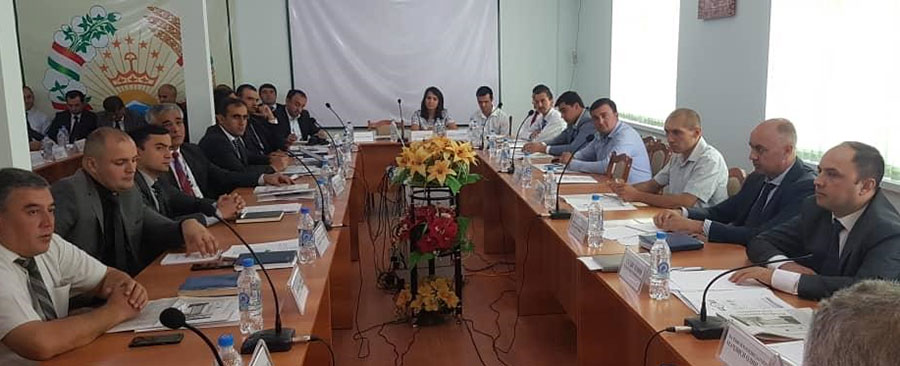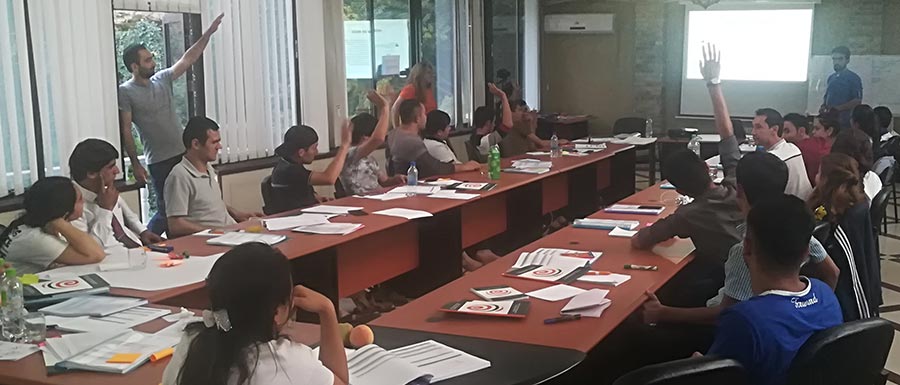IBAHRI activities in Tajikistan in 2018
Wednesday 1 January 2020
September 2018:
Tajik Union of Lawyers and IBAHRI collaborate in conference on independence of the legal profession
Legal reforms and targeted harassment have led to lawyers leaving legal profession in Tajikistan. The conference, held in September 2018, aimed to bring lawyers together to address the challenges they face and find scope for collaborating their efforts to bring about positive changes.
In September 2018, the International Bar Association’s Human Rights Institute co-organised with the Tajik Union of Lawyers an international conference on the independence of the legal profession in Dushanbe, Tajikistan.
The country’s legal profession has come under threat from the creeping influence of the State in recent years. In 2015, the Law on Advokatura was passed which gave the Ministry of Justice increased influence over entry to the legal profession. Lawyers are now required to retake their qualifying exams every five years and will lose their licence if they do not. This has created a cycle of reliance on the Ministry of Justice that has led to increased fear of the ramifications for challenging the government and Ministry.
Due to the legal reforms, the number of registered lawyers in the country dropped by 60 percent between 2015 and 20171.
The IBAHRI was grateful to work with the Tajik Union of Lawyers on the conference and commends their perseverance in the protection of the independence of the legal profession.

August 2018:
Tajikistan summer school facilitates powerful debates among young lawyers
IBAHRI summer school for Tajikistan’s law students in August 2018 aimed to enrich engagement with international case law and national practices. Students left with greater confidence in human rights issues.
The International Bar Association’s Human Rights Institute (IBAHRI) has been overwhelmed with the positivity and tenacity emanating from Tajikistan’s law students this year. The students have repeatedly expressed a strong interest in human rights law and the IBAHRI is keen to assist their further education in this field.
In August 2018, we ran a summer school for 28 young lawyers near Dushanbe, Tajikistan. International and local experts were brought in and the students engaged in lively debates on international case law and national practices. The summer school not only aimed to strengthen the students’ knowledge of human rights law but to encourage their confidence to critique and defend their positions.
The students asked questions, challenged one another and were creative in their application of international and national laws in the discussions. Without a doubt, these lawyers are en route to becoming a legal force to be reckoned with.

July 2018:
UN Special Rapporteur on the Independence of Judges and Lawyers receives information on Tajikistan’s legal profession from the IBAHRI
The International Bar Association’s Human Rights Institute (IBAHRI) expressed its concerns regarding the effects of the 2015 Law on Advokatura on the independence and freedom of legal professionals in Tajikistan.
In July 2018, the International Bar Association’s Human Rights Institute (IBAHRI) submitted information on the situation of the legal profession in Tajikistan to the United Nations Special Rapporteur on the Independence of Judges and Lawyers. Of particular concern for the IBAHRI were the barriers placed on the legal profession following the implementation of the 2015 Law on Advokatura, which reduced the number of practicing lawyers in the country from 2,000 to roughly 600. Under the same law, the Union of Lawyers was established, making it worryingly vulnerable to government influence.
The Qualifying Commission was made the principle authority on entry to the legal profession and is largely controlled by the Ministry of Justice. All lawyers are also required to retake their qualifying exams every five years; if they do not, they lose their licence. This has created a cycle of reliance on the Ministry of Justice that has led to increased fear of ramification for challenging the government and Ministry.
The IBAHRI is grateful to the UN Special Rapporteur for the opportunity to submit its findings and concerns.
June 2018:
Seven Tajik lawyers share concerns on legal reform at IBA international conference
The IBA conference ‘Advokatura 2018: Improving the Quality of Legal Services’, which took place in Kazakhstan, allowed attendees to discuss good practices and challenges experienced by legal professionals across Europe and Central Asia.
In June 2018, the International Bar Association’s Human Rights Institute (IBAHRI) supported the attendance of seven Tajik lawyers at the IBA’s international conference on ‘Advokatura 2018: Improving the Quality of Legal Services’. The conference took place in Almaty, Kazakhstan and was supported by the Council of Europe and the Organisation for Security and Co-operation in Europe. Lawyers from 13 European and Asian bars attended alongside representatives of Kazakhstan’s Ministry of Justice, Supreme Court, academia and civil society.
Good practices and challenges for the legal profession were discussed among the various groups, with particular focus on the independence of the profession, education, legal aid and rules of ethics. Attendees helped produced a set of recommendations at the end of the conference to progress the legal profession in these areas.
The Tajik lawyers were able to share their concerns on the 2015 Law on Advokatura, which established the Qualifying Commission under the Ministry of Justice as the principle authority on entry to the legal profession. Under this law, lawyers are required to retake their qualifying exams every five years and if they do not, they lose their licence. This has led to many lawyers feeling anxious about the ramifications for speaking out against the government and Ministry.
The opportunity to talk openly about legal reforms in Tajikistan was of significant timing given the draft Law on Advocate Activities and Legal Aid being developed in Kazakhstan.
May 2018:
Tajik lawyers attend UN CAT pre-session in Geneva, facilitated by the IBAHRI
The International Bar Association’s Human Rights Institute (IBAHRI) facilitated the attendance of two Tajik lawyers at the pre-session of the Committee Against Torture to discuss the situation in Tajikistan.
The United Nations Convention against Torture and Other Cruel, Inhuman or Degrading Treatment or Punishment (UNCAT) sets out State obligations to eradicate torture in any territory under its jurisdiction or when any victim (when appropriate) or alleged offender is a national of that State. The Committee Against Torture (CAT) is the body that monitors States’ implementation of the UNCAT, requiring all State parties to submit reports on the actions they have taken. Tajikistan ratified the UNCAT in 1995 and had its third period review by the CAT in May 2018.
The International Bar Association’s Human Rights Institute (IBAHRI) facilitated the attendance of two Tajik lawyers at the CAT pre-session in Geneva, Switzerland in May 2018. The lawyers were able to conduct advocacy efforts before key UN representatives and express their thoughts and concerns on the situation within their country, in particular in relation to the situation of lawyers.
In its Concluding Observations, adopted in June 2018, the Committee against Torture stated:
19. The Committee is concerned that recent amendments to the Bar and Advocacy Act (Advokatura Act) have given the Ministry of Justice undue influence over the Qualifying Commission responsible for licensing lawyers and have led to a dramatic drop in the number of lawyers in the country, and that these developments impede the State party’s ability to ensure that all people deprived of their liberty are able to access fundamental legal safeguards against torture and ill-treatment – including prompt access to an independent lawyer – in practice (art. 2).
20. The State party should amend the Bar and Advocacy Act with a view to strengthening the independence of the Qualifying Commission from the Ministry of Justice. The Committee recommends that the State party invite the Special Rapporteur on the independence of judges and lawyers to visit the country.
The full document can be found here: http://tbinternet.ohchr.org/Treaties/CAT/Shared%20Documents/TJK/CAT_C_TJK_CO_3_31244_E.pdf
1 https://freedomhouse.org/report/nations-transit/2018/tajikistan